by Allen Reynolds, UrbanFaith Editor | Jul 21, 2022 | Commentary, Headline News, Relationships |

Sex is a good thing. For all human history, human beings have had sex and been aware of their sexuality. It is a fundamental function of creation to reproduce that God instituted from the beginning. But sexuality is not simply about reproduction. It is about the awareness and expression of our bodies. We are spiritual beings, but we are also natural beings. God created us that way on purpose. If we were meant to be all spiritual, we would have been created like angels, but God made us from the earth on purpose. Jesus Christ came to us IN THE FLESH, not as a spiritual principle, a vision, or a disembodied being. Jesus was circumcised on the 8th day according to Jewish law, as all Jews were. This was a sexual act with spiritual meaning that is literally at the heart of the Old Covenant. Unfortunately, as New Covenant Christians we often overfocus on the spirit and miss the fact that the New Covenant is literally made because of Jesus’ BODY broken for us and blood shed for us. It is Jesus’ humanity, not spirit that is the sacrifice that reunites us with God. The conversation is different depending on your stage of life. Believers who are married with kids need to have different conversations than single believers in early adulthood, or teenagers, or those who are divorced, or single after the death of a spouse. But regardless of our age or station in life we need to do a better job having these conversations as Christians. Here are 3 major reasons why Christians need to talk about sex.
-
God created us to be sexual beings
Every person was designed to be sexual, and that goes far beyond having sex. When God created Adam and Eve, they were meant to relate to one another sexually and their relationship to be closer than parent to child in future generations. They were naked and unashamed of their bodies (Genesis 2:24-35). There are any number of reasons why believers are ashamed of their sexuality today, many of them unfortunately from bad teaching in churches. But that is not the design of God. We were created to relate to one another sexually BEFORE sin entered the world.
-
Christian sexuality is meant to be different
A lot of our confusion, angst, shame, sorrow, and frustration with reconciling our sexuality with our faith is because of a Biblical principle that Christian sex is meant to be different than sexuality for those who don’t follow Christ. The covenant between God and Abraham made Israelite men sexually different from their neighbors in other nations (Genesis 17). The Law of Moses set up sexual limitations and regulations that were meant to distinguish Israel from other nations. The principle always pushed toward relationship with God reflected in our sexual relationships with others. The word used in scripture is holy, but to translate that our modern culture we might say intentional, purposeful difference that honors God. Paul picks up this Jewish principle in the New Testament by articulating a vision of sexual relationships that is monogamous, mutual, caring, and loving that reflect Christ’s love. We have often been caught up on the restrictions and missed the vision in the church. We have to be responsible with our sexuality because we are accountable to God in a different way as followers of Christ. We are called to be vulnerable, loving, and intentional with our sexuality in a way that is different than the world around us.
-
We should love and not fear our sexuality
1 John 4:18 reminds us that perfect love casts out all fear. The world has set false standards that promote fear, violence, and mistrust in sexual relationships. We have no need to rehearse the many ways popular culture, corporate interests, and sociopolitical forces use and abuse sexuality. Often their goals are to use sex to make money and create false intimacy. But for many believers we have been taught to fear sexuality to maintain holiness. It has caused believers to have arrested development, face shame and ridicule, leave churches, and seek unhealthy sources to define their sexuality. We rarely speak of the difficulties many newly married Christian couples face around sexual expectations, communication, and formation because of ignorance, self-rejection, and fear. We do not talk about the struggles teenagers face with loving their bodies instead of hating and fearing them. We do not deal with the choice to not have sex as young adults instead of treating sex as an uncontrollable inevitable impulse. We are afraid of the word intimate because we have been taught it is dirty. Our bodies are not beasts to be tamed. They are part of us to be loved. Paul Himself would agree with this, treating our bodies as a Temple of God means loving and tending to them with the utmost care (1 Corinthians 6:19-20). Not fearing and avoiding them as we abuse them and let them be abused by others. But Jesus loves us. He loves our bodies. He wants us to love God with our bodies just as we do with our minds and hearts. And we make sexual choices that build intimacy and protection with our romantic partner. We do not discuss the why of a holistic view of Christian sexuality which sets us up for pain before and during marriage. But we should talk about sex. We should love our bodies and our sexuality. We should define what sexual holiness means as believers in terms of what we choose to do instead of what we feel we can’t do. We should honor God’s design for sexuality by loving our neighbors as we love ourselves, sexuality included.
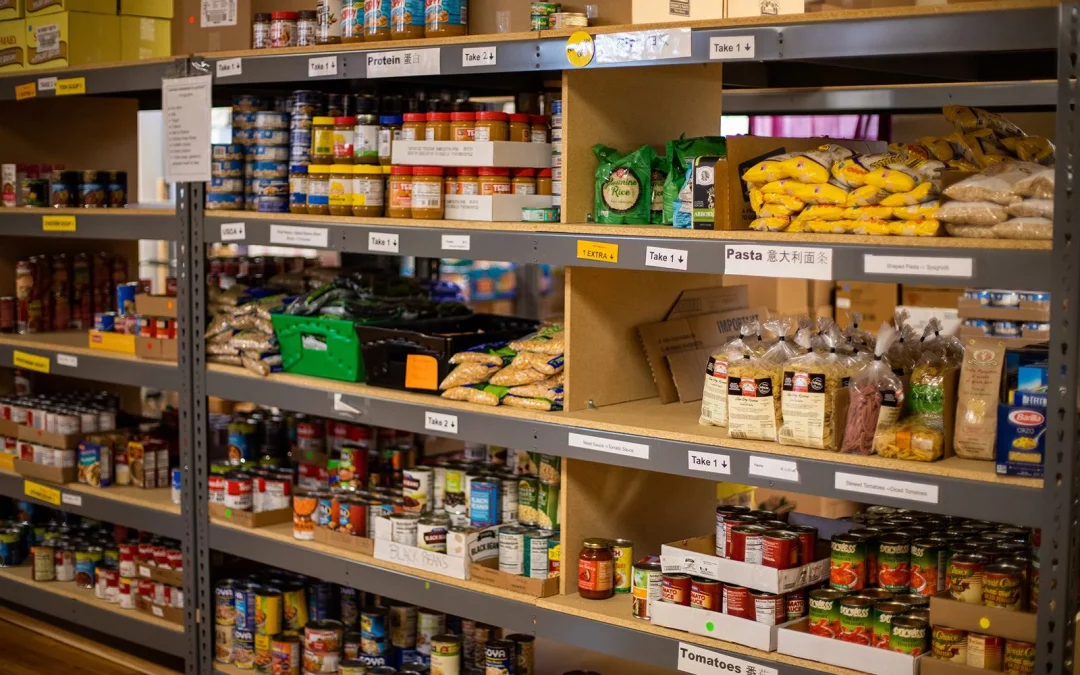
by Haley Barker, Riley Farrell, and Marika Proctor (RNS) | Jul 7, 2022 | Commentary, Headline News, Social Justice |
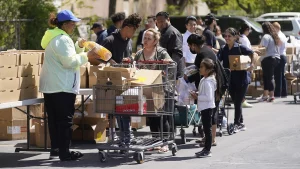
(RNS) — At the Seven Loaves Food Pantry at St. Andrew’s United Methodist Church in Plano, Texas, volunteers have been serving 800 to 1,200 families a week since the COVID-19 pandemic began — about four times the weekly traffic in 2019.
At the ICNA Relief Food Pantry in Raytown, Missouri, just east of Kansas City, 100 new families have registered to receive the Muslim-led organization’s services in just the past month.
“We are busier than ever right now,” said Shannon Cameron, executive director of the Aurora Area Interfaith Food Pantry in Aurora, Illinois, where, after a slight dip around tax return season, between 30 and 60 new families are registering every week.
The inflation that has loomed over the economy and restricted many Americans’ purchasing power of late has doubly affected low-income people who already struggle to get by. A recent survey by the anti-hunger organization Feeding America has shown that increased demand has affected nearly 80% of U.S. food banks, as higher prices cause more families to seek assistance.
And while President Joe Biden recently signed the Keep Kids Fed Act, extending free meal programs for schoolchildren, many stopgaps funded during the pandemic have ended or are only available in some states.
“For the households that were already food insecure in 2020, nearly half of those reported using a food pantry,” said Jordan Teague, interim director for policy analysis and coalition building at Bread for the World. “Now, more people are facing the crisis. We’re all sort of feeling that pinch, and government programs are coming to an end.”

Since the 1980s, the U.S. Department of Agriculture has donated surplus commodities it buys to stabilize farm prices to the Charitable Food Assistance System, a network of food banks. For four years, the Trump administration bolstered the program to offset the cost of its tariff increases, raising the share of the USDA’s contributions to as much as 15% of some food banks’ supplies. Those resources, too, have now tailed off.
“We saw a real increase even before the pandemic hit in those USDA commodities and, obviously, during the pandemic, USDA made more commodities available as well,” said Celia Cole, CEO of Feeding Texas, a faith-based food security organization based in Austin. “Now, without them, we’re seeing a drop-off.”
Food banks are looking more than ever to make up the gaps with private monetary donations, and government financial assistance. “For every dollar donated to a food bank, we can stretch it to four meals,” said Cole. “We encourage people to be educated with their elected officials in support of hunger-fighting programs like SNAP and the Child Nutrition Programs.”
Historically high gas prices have added further strain on local food pantries, causing delays in the transport of food from farm to market, and from market to food banks.
“We own a fleet of semis,” said Mike Hoffman, inventory and logistics director at Midwest Food Bank, a Christian charity that supplies more than 2,000 churches, nonprofits and community centers across the country. “Fuel prices have taken a toll. We’ve gone through our entire year’s fuel budget in the first five months.”
The same supply chain problems, including a lack of available truck drivers, that have beset the economy apply to fighting hunger as well. Barbara Wojtklewicz, part of the leadership team that runs the food pantry at Christ Church in Plymouth, Massachusetts, said staff at the Greater Boston Food Bank, a regional network of 600 food distributors, have reported driver shortages recently.
“There is ample food to distribute,” Wojtklewicz told Religion News Service, “but they’ve had to limit … distribution to different food pantries.”
Maj. Deb Coolidge at the Salvation Army’s food distribution center in Plymouth has had trouble sourcing fresh food. “Less salad mix and cucumber — oranges and apples,” Coolidge said. “Those have not been on the list for the last couple of months.”
At ICNA Relief in Missouri, Ferdous Hossain, associate operations coordinator, has likewise found it increasingly difficult to provide fresh produce to the 300 families who rely on the pantry for food assistance each month. Local agencies, farms and food banks that ICNA collaborates with are also feeling the produce pinch.
 To live up to her center’s unofficial motto — “Fresh produce. Fresh fruit. Anything and everything that is fresh” — Hossain has been buying produce at the grocery store, a last resort because of higher prices.
To live up to her center’s unofficial motto — “Fresh produce. Fresh fruit. Anything and everything that is fresh” — Hossain has been buying produce at the grocery store, a last resort because of higher prices.
Donors are also stepping up, thinking creatively to help fill the gaps. Wojtklewicz said that the Christ Church pantry in Plymouth received 100 gift cards to local grocery stores along with its shipment from the Greater Boston Food Bank.
As economists prepare Americans for a possible recession, Beth Zarate, president and CEO of Catholic Charities West Virginia, expressed “anxiety” about the rural residents in her state and their ability to stay ahead of increased gas prices and food costs. At 15.1%, West Virginia has the highest percentage of households facing hunger, according to a 2020 USDA study.
Zarate is counting on West Virginians to come to their neighbors’ aid. “West Virginia is unique because we come out at the bottom of every chart in terms of chronic health issues, hunger and poverty,” Zarate said. “But we also have people who are good to each other.”
“People are generous,” said Darra Slagle, director of Rose’s Bounty, a food pantry operating out of Stratford Street United Church in Boston, “and when they are made aware of the need, are able to help. I encourage people to give to their local food pantries. They could use money to get the things that they need.”
Hoffman at the Midwest Food Bank said prayer is another life raft for anti-hunger operations.
“We have a lot of prayer warriors,” he said. “The faith community is a huge part of what we do, (and) many churches pray for us. The Bible says, ‘The poor you’ll have with you always,’ so we know we have a job that needs to be done, and we’ll keep getting it done.”
by Ramon Mayo | May 24, 2022 | Headline News |
The internet is saturated with tons of information for all facets of life, including spiritual resources.
In fact, if you do an Amazon search for something like study Bible results will include a wide variety of options. While scrolling down the list, you will find study Bibles for men and women. You will find study Bibles for couples and you can also find a study Bible in just about every translation. So why would anyone need another study Bible, particularly the Africa Study Bible?
Well, to start, we suppose you should start by asking, “What exactly is the Africa Study Bible?”
While all of aforementioned study Bibles have their merit, the Africa Study Bible delivers something unique. It contains insight and knowledge about the Bible from a non-majority culture perspective. It is packed with over 2,400 features, and 350 scholars from more than 50 African countries have contributed to the making of this Bible.
The features of the Africa Study Bible speak on different topics through the lens of African culture. Whether you’re African or a member of the African Diaspora, this Bible provides in-depth knowledge to show that Christianity extends beyond just one group of people.
Contrary to popular opinion, Christianity is not solely the territory of those of European ancestry. In fact, it is the countries and cultures of the South and the East where Christianity is growing at a rapid rate. Not only that, but studies show that Africa played a major role in the development of Christian theology. The Africa Study Bible helps to make that clear and it can make that clear for you as well.
The Africa Study Bible is loaded with tons of features, including:
- Book introductions explaining the history of each book
- Touch Points to show where the culture of the Bible meets African cultures and how Africans shaped Christian belief
- Learn Notes to teach the foundations, values, and the doctrine of the Christian faith.
- Proverbs and Stories to enlighten readers through the parallels of Scripture and cultural wisdom found in wise sayings and fables.
- Application Notes to inspire readers to reflect on issues and apply truth to everyday life
- Articles giving practical advice on how to live out the Christian faith, focusing on 50 critical concerns facing the church in Africa and its people
- Topical Index and Concordance that lists the biblical text s and Africa Study Bible features by topic and defines difficult-to-understand words connecting concepts from Genesis to Revelation for research and teaching
- Maps, Graphical Timelines, and Other Features that spread throughout the Bible and help provide insight and understanding
With this Bible you will have specific insight and knowledge into the cultures and customs of the Bible from an African perspective. This will equip you with tools to share non-majority insights with your congregation or Bible study. The Africa Study Bible can help you to reclaim Christianity’s African roots.
Check out our interview with Dr. A. Okechukwu Ogbonnaya, Ph.D. on the inspiration behind the Africa Study Bible and its impact on our community below:

by Maina Mwaura, Urban Faith Contributing Writer | May 10, 2022 | Commentary, Headline News |
Jackie Hill Perry is one of the most sought after speakers and poets in the country. Her passion for God and using her pen to serve Him led her to write her most recent book: Holier Than Thou: How God’s Holiness Helps Us Trust Him. UrbanFaith sat down to discuss the new book with her. The interview has been edited for clarity. More information on the book is below.
If God is holy, then He can’t sin. If God can’t sin, then He can’t sin against you. If He can’t sin against you, shouldn’t that make Him the most trustworthy being there is?
Bestselling author Jackie Hill Perry, in her much-anticipated follow-up to Gay Girl, Good God, helps us find the reason we don’t trust God—we misunderstand His holiness.
In Holier Than Thou, Jackie walks us through Scripture, shaking the dust off of “holy” as we’ve come to know it and revealing it for what it really is: good news. In these pages, we will see that God is not like us. He is different. He is holy. And that’s exactly what makes Him trustworthy. As it turns out, God being “holier than thou” is actually the best news in the world, and it’s the key to trusting Him.
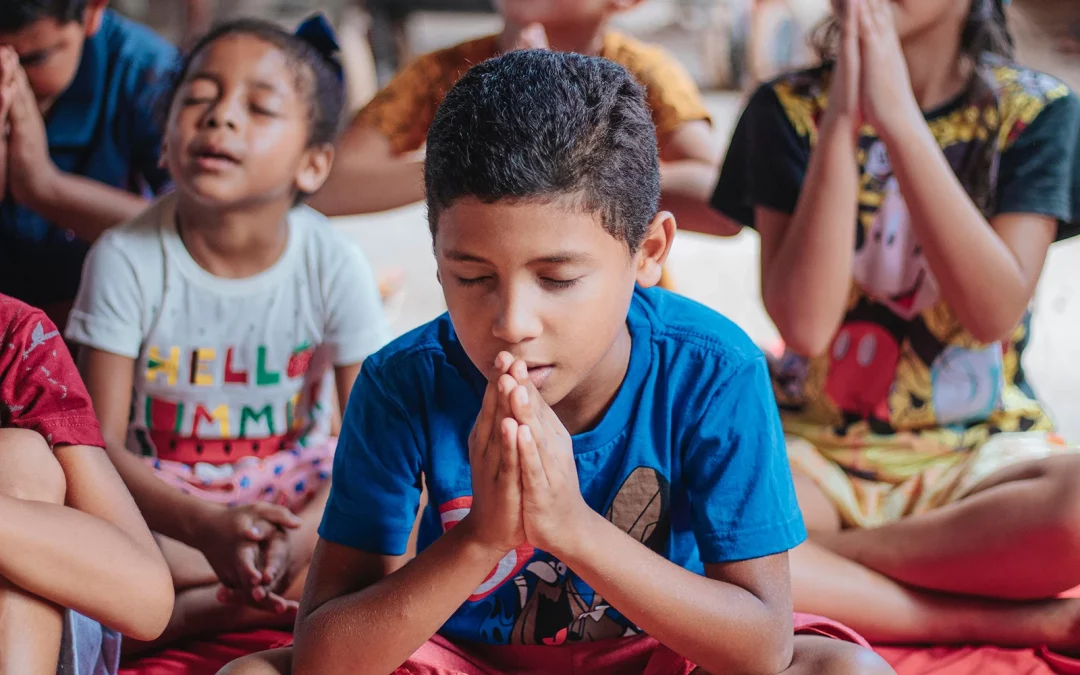
by Adelle M. Banks, RNS | May 5, 2022 | Commentary, Headline News |
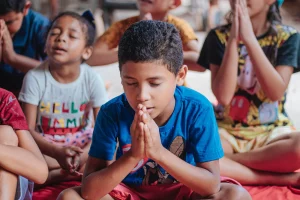
(RNS) — Sunday school and other Christian education programs have suffered during the COVID-19 pandemic, with half of congregations surveyed saying their programs were disrupted.
A March 2022 survey by the Hartford Institute for Religion Research found that larger churches with more than 100 people were more successful in maintaining their educational programming for children and youth, often using in-person or hybrid options. Smaller churches, especially those with 50 or fewer attendees, were least likely to say they continued religious education without disruption.
Scott Thumma, principal investigator of the Exploring the Pandemic Impact on Congregations project, said the findings echoed concerns about general education of schoolchildren, where researchers have seen declines in learning over the last two years.
“My sense is that people knew what good robust Sunday school was or what a successful vacation Bible school was,” said Thumma, drawing in part on open-ended comments in the survey. “And they couldn’t parallel that using Zoom or using livestreaming or using take-home boxes of activities. It just wasn’t the same thing. And so when they evaluated it, it just didn’t measure up to what they previously knew as the standard of a good quality religious education program.”
The findings are the third installment in the five-year project, a collaboration with 13 denominations from the Faith Communities Today cooperative partnership and institute staffers.
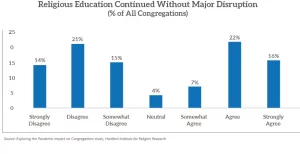
The new report, “Religious Education During the Pandemic: A Tale of Challenge and Creativity,” is based on responses from 615 congregations across 31 denominations.
Comparing data from 2019, churches surveyed in March 2022 reported that the attendance of their religious education programs had decreased an average of 30% among children younger than 13 and 40% among youth, ages 13-17.
“Analysis showed that those who closed their programs had the greatest decline in involvement even after they restarted,” the new report states. “Likewise, churches that moved religious education online lost a higher percentage of participants than churches who modified their efforts with safety protocols but continued meeting in person either outdoors or in small groups.”
The report notes that it’s not surprising the smallest churches experienced the most disruption in their religious education, given the decline in volunteer numbers and additional stresses on clergy during the pandemic.
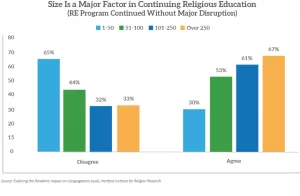
“In the smallest churches (1-50 attendees) pastors were most likely in charge of the religious education programs, while for those between 51 and 100 worshippers, volunteers bore the bulk of leadership responsibilities,” according to the report.
Overall, evangelical churches reported experiencing the least disruption to their educational programs, while mainline churches reported the most, followed by Catholic and Orthodox congregations.
Vacation Bible school, long a staple of congregational outreach to local communities, has also been shaken by COVID-19. More than a third (36%) of churches offered such programs prior to the pandemic. That number decreased to 17% in 2020 and jumped back to 36% in the summer of 2021. Slightly less than a third (31%) reported VBS plans for 2022.
While children’s programming was greatly affected by congregational change during the pandemic, adult religious programs saw the smallest decreases compared with pre-pandemic levels, with a quarter growing since 2019 and an almost equal percentage (23%) remaining even.
But, as with children’s programs, churches with 50 or fewer worshippers saw the greatest loss in adult religious education, while those with more than 250 in worship attendance increased their adult programs by an average of 19%.
Some congregations reported moving Sunday school activities to weeknights or vacation Bible schools from weekday mornings to later hours, with mixed results.
“One said they ‘went from a typical 200+ kids to about 35,’” the report notes, and they “’shortened the number of days and moved VBS to the afternoon.’”
Thumma said innovations including intergenerational and kid-friendly programming helped sustain programs for people of all ages in some congregations. These included revamping of the children’s message time during worship to be more inclusive or older members greeting children who run by during Zoom sessions. Some churches called their all-ages activities “messy church” or “Sunday Funday” as they used interactive educational events.
“It becomes, out of necessity, intergenerational because that allows you to have robust energy and lots of people there,” he said. “But it really is directed at the kids being involved in the life of the congregation in a way that isn’t, like, ‘OK, you go to your class’ and ‘you go to your classes,’ and the classes don’t ever mingle.”
Whether creative steps such as new intergenerational activity will continue remains to be seen, Thumma added.
“I think it should because that’s a valuable strategy,” he said. “One of the things that we’ve seen in lots of our research is the more intergenerational the congregation is, the more it has a diversity of any degree, the more likely they are to be vital and thriving.”
The findings in the new report of the project, which is funded by the Lilly Endowment, have an estimated overall margin of error of plus or minus 4 percentage points.
READ THIS STORY AT RELIGIONNEWS.COM





 To live up to her center’s unofficial motto — “Fresh produce. Fresh fruit. Anything and everything that is fresh” — Hossain has been buying produce at the grocery store, a last resort because of higher prices.
To live up to her center’s unofficial motto — “Fresh produce. Fresh fruit. Anything and everything that is fresh” — Hossain has been buying produce at the grocery store, a last resort because of higher prices.



